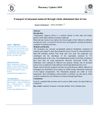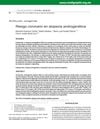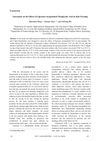 April 2021 in “Journal of Investigative Dermatology”
April 2021 in “Journal of Investigative Dermatology” Bacteria can help skin regenerate through a process called IL-1β signaling.
March 2021 in “World rabbit science” Adding 0.2% taurine to Angora rabbits' diet improves wool production and overall health.
January 2021 in “Figshare” Autophagy helps delay aging in mouse glands, maintains fat balance, and controls scent production.
 February 2020 in “Research Square (Research Square)”
February 2020 in “Research Square (Research Square)” Skin tags in obese individuals may indicate a higher risk of heart disease and diabetes.
 January 2020 in “International journal of medicinal plants and natural products”
January 2020 in “International journal of medicinal plants and natural products” Ayurvedic Panchakarma therapy, Virechan, can effectively manage PCOS symptoms and improve health markers.
 January 2020 in “International Journal of Research”
January 2020 in “International Journal of Research” High testosterone increases heart disease risk in women with PCOS.

People with androgenic alopecia are more likely to have metabolic syndrome than healthy individuals.
 April 2019 in “The journal of investigative dermatology/Journal of investigative dermatology”
April 2019 in “The journal of investigative dermatology/Journal of investigative dermatology” DHT may reduce inflammation caused by certain bacteria in skin cells.
January 2019 in “Springer eBooks” Sebaceous glands play a key role in skin health and conditions like acne.
 September 2018 in “Fertility and Sterility”
September 2018 in “Fertility and Sterility” African American women have a higher risk of preterm delivery than Caucasian women, and inflammatory stimuli affect gene expression in cells related to PCOS, showing a heightened inflammatory state in women with PCOS.
 March 2018 in “International Pharmacy Acta”
March 2018 in “International Pharmacy Acta” New niosomal formulation effectively delivers aminexil through rat skin.
February 2018 in “Biophysical Journal” Cyclosporine A slowly changes cell membranes, explaining some of its effects and side effects.
January 2018 in “Iranian Journal of Pharmaceutical Sciences” Urea, eucalyptus oil, and menthol improve minoxidil skin absorption.
January 2018 in “대한미용학회지” White hair is denser and more hydrophobic than black hair.
October 2017 in “The Egyptian Journal of Hospital Medicine ” More young women are getting diagnosed with PCOS, which can lead to other health problems, but early treatment can help.
 September 2017 in “The journal of investigative dermatology/Journal of investigative dermatology”
September 2017 in “The journal of investigative dermatology/Journal of investigative dermatology” Human hair follicles have a unique way of using energy and might use the Cori cycle; blocking CCR5 could help treat hair loss.
 September 2017 in “Journal of Investigative Dermatology”
September 2017 in “Journal of Investigative Dermatology” Researchers created human cells that can turn into sebocytes, which may help study and treat skin conditions like acne.
 January 2017 in “Springer eBooks”
January 2017 in “Springer eBooks” The document concludes that scalp health is influenced by complex factors affecting sebaceous glands, including hormones, aging, and various substances.
 August 2016 in “Journal of Investigative Dermatology”
August 2016 in “Journal of Investigative Dermatology” Scalp psoriasis features reversible hair loss and specific immune activation, with no significant hair follicle damage.
 August 2016 in “Journal of Investigative Dermatology”
August 2016 in “Journal of Investigative Dermatology” The endocannabinoid system affects oil production and inflammation in skin cells.
April 2016 in “The journal of investigative dermatology/Journal of investigative dermatology” Sebaceous gland atrophy and abnormal function may contribute to hair loss in psoriasis.
 April 2016 in “Journal of Investigative Dermatology”
April 2016 in “Journal of Investigative Dermatology” MEK and BRAF inhibitors increase sebum production and accumulation, which could cause acne-like side effects.
 June 2015 in “Biomedical and biopharmaceutical research”
June 2015 in “Biomedical and biopharmaceutical research” The congress showed advancements in skin hydration, barrier function, and safe, effective new cosmetic formulations.
 September 2014 in “Aktuelle Dermatologie”
September 2014 in “Aktuelle Dermatologie” The symposium concluded that environmental factors significantly contribute to skin aging.
 January 2014 in “Revista del Centro Dermatológico Pascua”
January 2014 in “Revista del Centro Dermatológico Pascua” Male pattern baldness is not a risk factor for heart disease based on cholesterol levels alone.
January 2014 in “Healthy aging research” Polycystic ovarian disease symptoms can continue after menopause, making diagnosis and management in older women challenging.
 January 2014 in “Sen i Gakkaishi”
January 2014 in “Sen i Gakkaishi” Liposome-encapsulated thioglycolic acid improves hair perming effectiveness and durability.
Linoleic acid is essential for healthy skin, and while deficiency is rare in Western societies, it can cause dry, scaly skin and hair loss.
 July 2012 in “The Journal of Urology”
July 2012 in “The Journal of Urology” Testosterone increases muscle mass regardless of DHT conversion blocking.
 February 2008 in “Experimental dermatology”
February 2008 in “Experimental dermatology” Oxidative stress plays a significant role in vitiligo, and both skin and non-skin cells may be involved.




















